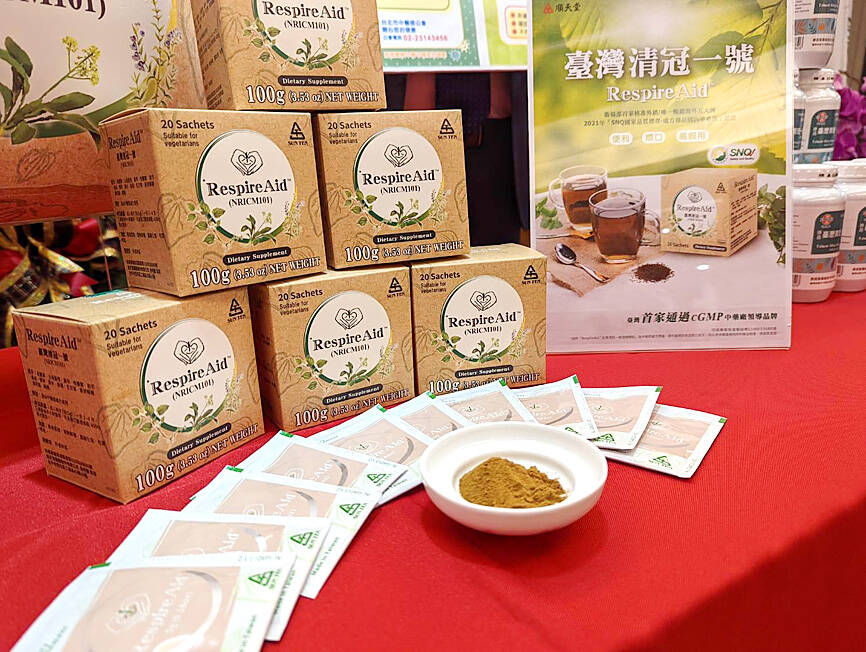Emergency use authorization (EUA) for a traditional herbal formula for treating COVID-19 has been extended until June next year, Minister of Health and Welfare Hsueh Jui-yuan (薛瑞元) said yesterday.
The ministry has extended the EUA for Chingguan Yihau (清冠一號), also marketed as Respire Aid and NRICM101, to give pharmaceutical companies time to complete clinical trials and obtain a drug permit before the authorization expires, Hsueh said.
Hsueh made the remarks at the Taipei Traditional Chinese Medicine International Forum, hosted by the National Union of Chinese Medical Doctors’ Association, where Vice President William Lai (賴清德) said he had taken Chingguan Yihau when he contracted COVID-19.

Photo: Wu Liang-yi , Taipei Times
Lai said that he was not eligible for antiviral drugs, but felt that his respiratory symptoms were greatly relieved by taking the herbal medicine.
More than 1.5 million people have taken Chingguan Yihau for COVID-19 and many still take herbal medicines to relieve their symptoms after an acute infection, association chairman Chan Yung-chao (詹永兆) said.
The number of estimated Chinese herbal medicine users has increased by 40 percent to about 8.15 million people in 2021, he said.
Hsueh said that traditional herbal medicines would be included in the ministry’s drug shortage reporting system as early as next month.
The Pharmaceutical Affairs Act (藥事法) requires pharmaceutical firms to report shortages of drugs to the Food and Drug Administration, but as drug shortage reports are now being reviewed by the ministry, it would include traditional herbal medicines in the system, he said.
The supply of herbal medicine ingredients has been affected by global political and economic events, so Taiwan must re-evaluate the situation and, hopefully, establish a self-sufficient supply chain through cross-ministerial cooperation or with New Southbound Policy countries, he said.
Separately, the Central Epidemic Command Center (CECC) yesterday reported 8,869 new local COVID-19 cases, 12.1 percent fewer than on Sunday last week.
It also reported 224 imported cases and 39 deaths.
Centers for Disease Control (CDC) Deputy Director-General Philip Lo (羅一鈞), who is also the CECC’s spokesman, said that as daily local caseloads have remained at a low level, the next phase of easing the mask mandate for healthcare facilities and at public transportation venues is expected to be discussed in the middle of next month.
Regarding whether more people might report infections this week to receive COVID-19 insurance compensation before it becomes invalid, as mild cases would no longer be required to be reported or enter quarantine from Monday next week, Lo said he expected some slight fluctuations.
However, as no new subvariants of SARS-CoV-2 have been reported recently, daily case counts are not expected to increase by much, he added.

The Coast Guard Administration (CGA) yesterday said it had deployed patrol vessels to expel a China Coast Guard ship and a Chinese fishing boat near Pratas Island (Dongsha Island, 東沙群島) in the South China Sea. The China Coast Guard vessel was 28 nautical miles (52km) northeast of Pratas at 6:15am on Thursday, approaching the island’s restricted waters, which extend 24 nautical miles from its shoreline, the CGA’s Dongsha-Nansha Branch said in a statement. The Tainan, a 2,000-tonne cutter, was deployed by the CGA to shadow the Chinese ship, which left the area at 2:39pm on Friday, the statement said. At 6:31pm on Friday,

The Chinese People’s Liberation Army Navy’s (PLAN) third aircraft carrier, the Fujian, would pose a steep challenge to Taiwan’s ability to defend itself against a full-scale invasion, a defense expert said yesterday. Institute of National Defense and Security Research analyst Chieh Chung (揭仲) made the comment hours after the PLAN confirmed the carrier recently passed through the Taiwan Strait to conduct “scientific research tests and training missions” in the South China Sea. China has two carriers in operation — the Liaoning and the Shandong — with the Fujian undergoing sea trials. Although the PLAN needs time to train the Fujian’s air wing and

The American Institute in Taiwan (AIT) put Taiwan in danger, Ma Ying-jeou Foundation director Hsiao Hsu-tsen (蕭旭岑) said yesterday, hours after the de facto US embassy said that Beijing had misinterpreted World War II-era documents to isolate Taiwan. The AIT’s comments harmed the Republic of China’s (ROC) national interests and contradicted a part of the “six assurances” stipulating that the US would not change its official position on Taiwan’s sovereignty, Hsiao said. The “six assurances,” which were given by then-US president Ronald Reagan to Taiwan in 1982, say that Washington would not set a date for ending arm sales to Taiwan, consult

A Taiwanese academic yesterday said that Chinese Ambassador to Denmark Wang Xuefeng (王雪峰) disrespected Denmark and Japan when he earlier this year allegedly asked Japan’s embassy to make Taiwan’s representatives leave an event in Copenhagen. The Danish-language Berlingske on Sunday reported the incident in an article with the headline “The emperor’s birthday ended in drama in Copenhagen: More conflict may be on the way between Denmark and China.” It said that on Feb. 26, the Japanese embassy in Denmark held an event for Japanese Emperor Naruhito’s birthday, with about 200 guests in attendance, including representatives from Taiwan. After addressing the Japanese hosts, Wang